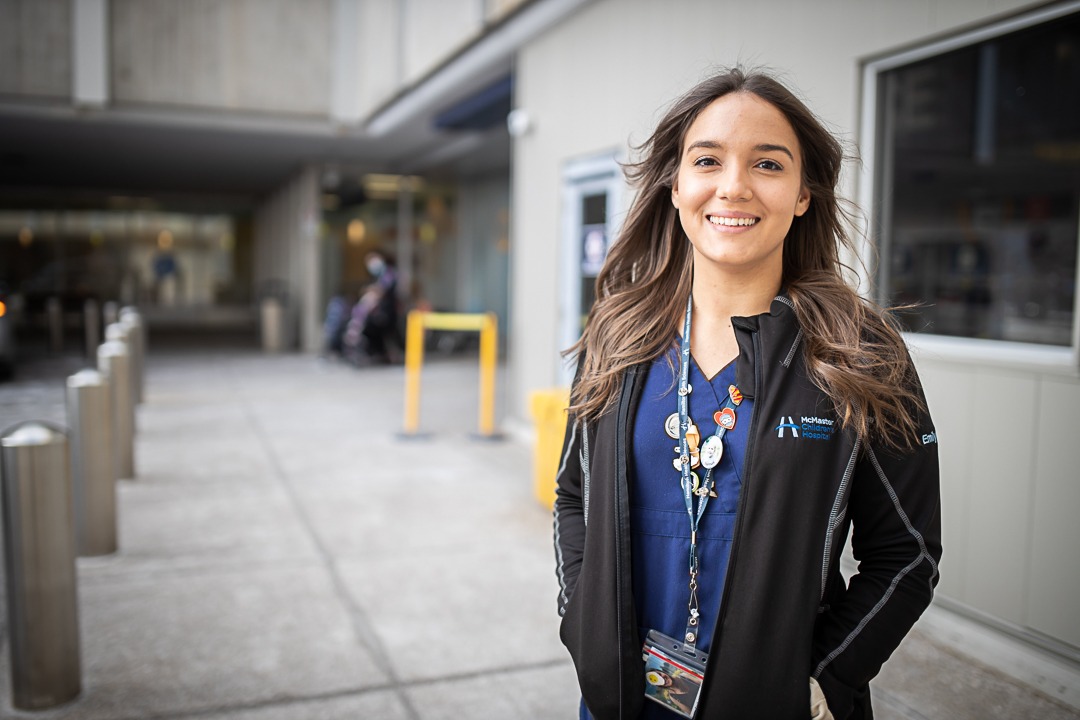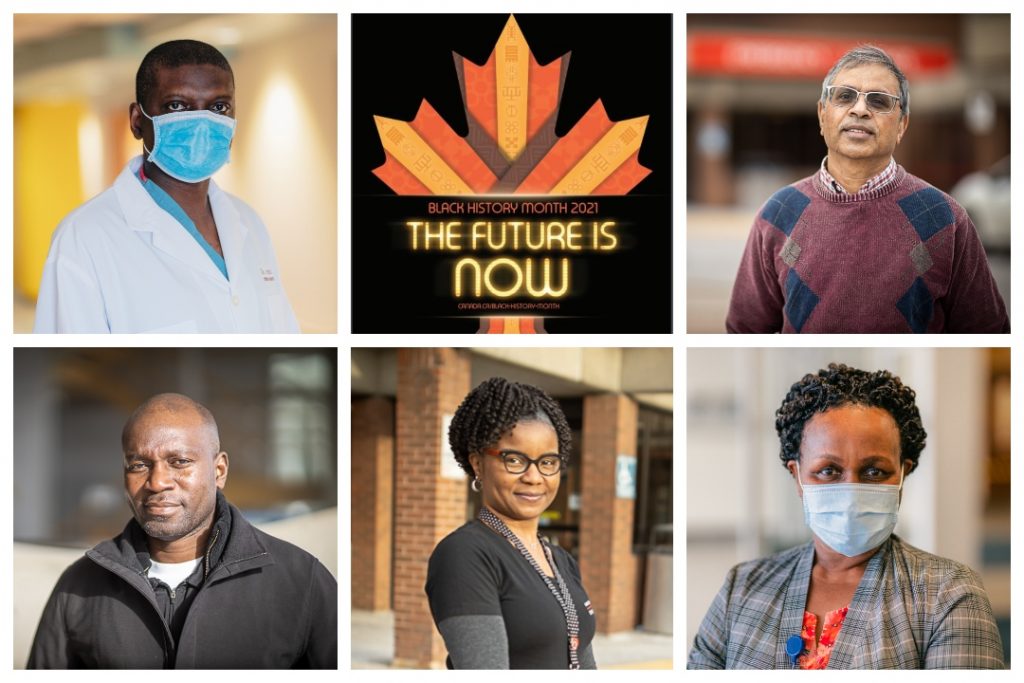
“The journey will not always be easy but it will be worth it.”
This year’s Black History Month is taking place in the midst of a pandemic. We posed a range of questions to some of our colleagues, including how COVID-19 is impacting their lives, how they’re celebrating Black History Month, who their role models are and what insights they would share with young Black people considering a career in healthcare.
Dr. Olufemi (Femi) Ajani
Head of Pediatric Neurosurgery, McMaster Children’s Hospital
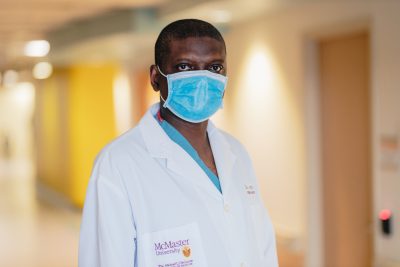 What does Black History Month mean to you?
What does Black History Month mean to you?
Black History Month serves as a time to recognize, remember and celebrate the contribution of immigrants of African descent to Canadian society and diversity. This has not always been the case historically.
Who are your role models – personal or public, and why?
- Martin Luther King – He fearlessly, relentlessly and peacefully fought for human rights. His speeches are brilliant, truthful and inspiring.
- Albert Einstein – His scientific achievements are well known but he also applied common sense in his thoughts and actions. He was an advocate for human rights in his speeches and personal deeds. His achievements transcend science.
- Personal – All physicians, especially my trainers who put patient interest and others first before anything else.
How are you celebrating Black History Month now that COVID has shut down events?
I try to follow events online and in the newspapers and radio, as well as reading about black history.
How has COVID affected your job/patients?
We are seeing most patients virtually. We do see late presentations because some patients do not want to go to the ER when they first notice symptoms. Sometimes we are experiencing a shortage of nursing staff because of quarantine requirements. I am personally extremely careful so that I do not fall ill or break personal protective equipment/public health rules and have to isolate and deprive patients of my services.
If you had one message for young Black people who are interested in a career in healthcare, what would it be?
Go for it fearlessly. It seems a lot of young dark-skinned people get discouraged early, thinking that they would not be given the opportunity because of discrimination or biases. Training institutions now recognize that disparities in the racial distribution of health care workers contribute to poor outcomes and are instituting systems to correct the imbalance.
Dr. Punginathn Dorasamy
Internist and Respirologist, COVID unit, Hamilton General Hospital
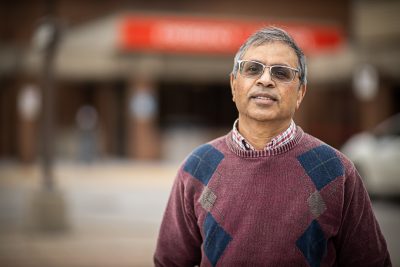 What does Black History Month mean to you?
What does Black History Month mean to you?
This wasn’t something I was familiar with until recently. Having moved to Canada about 20 years ago, I understand the basis for having a month to celebrate Black history. It takes me back to my own roots. I came from South Africa originally. Ethnically I’m an Indian, but in terms of my background, I always considered myself South African. Indians and Blacks were severely oppressed people and it was all on the basis of colour. It really takes me back to South Africa where Blacks and Indians were victims of the iniquitous “apartheid” or “separate development” system which ranged from living in separate group areas based on race, to attending different schools/universities, including inequities in our drinking water.
Who are your role models and why?
The first person that comes to my mind is Nelson Mandela. Mr. Mandela sacrificed most of his life, including imprisonment for 27 years, fighting an unjust system. He fought for us for decades and set the ground rules for how we became emancipated. I was honored and privileged to have met Mr. Mandela in a bookstore in 1990. I can still remember his stature and the energy that emanated from him with tremendous amount of calmness, dignity and magnificence despite being straddled by heavily armed guards. He was an amazingly peaceful man despite the government’s depiction of him as a “terrorist” and sought equality amongst all people, irrespective of race, colour or religious beliefs.
Over the years during my stay in Canada I have come to realize the contributions made by Canadians such as Lincoln Alexander and Michaëlle Jean, amongst others in shaping this country too.
How are you celebrating Black History Month now that COVID has shut down events?
Presently I am working in the COVID ward and I spend much of my time here right now. I understand that it could be a celebration but for me it is a time of reflection and remembrance.
I remember the Soweto riots when Blacks were protesting against the Afrikaans language. For us, it was compulsory to learn. If we did not, we could not complete high school for entrance to a university or college. In 1986, Black students were protesting against this. They had to learn English, their own languages and Afrikaans, which was the official language of the government. I was a junior physician then, and was at the forefront of having to treat these young children from “buckshots” that were embedded in their skin after being shot in the back while fleeing from police brutality. This is what Black History means to me.
How has COVID affected your job/patients?
I have been a physician for 35 years and I have never seen anything before like this COVID infection. I’ve been in the midst of epidemics of malaria, tuberculosis and Ebola, but the magnitude was barely as severe as the COVID pandemic and healthcare workers have now become more vulnerable. The pandemic has changed many of the ways we practice, including virtual assessment of our clinic patients. This has also affected the timely assessment of many of our new or follow-up patients in person, leading to more hospitalizations of greater severity.
If you had one message for young Black people who are interested in a career in healthcare, what would it be?
I would tell them, whatever they do in healthcare, do it well. Like the quotation from Abraham Lincoln, “Whatever you are, be a good one.” If they’re looking at being a physician, take the time to listen to your patients, examine them, be compassionate and help them as best you can.
Ernst Jean Pierre
Nutrition Associate, McMaster Children’s Hospital
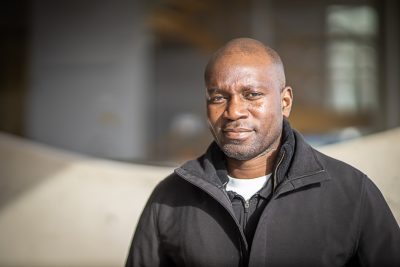 What does Black History Month mean to you?
What does Black History Month mean to you?
We’re all human, that’s the way I see it. Whether you’re born in Africa or Italy or anywhere, Black or white, for me it doesn’t matter, it’s just the way you’re born.
Who are your role models and why?
I have so many but the two big ones are Martin Luther King and Barak Obama. One for the old generation and one for the new.
How are you celebrating Black History Month now that COVID has shut down events?
My country was the first to have Black freedom. I am originally from Haiti and we celebrate Freedom Day/ Independence Day on Jan. 1 every year. So I celebrate Black History then. We eat squash soup and have a big turkey dinner, like Thanksgiving. Before freedom, the Haitian people were not allowed to eat together, so now we celebrate with a feast. This year we didn’t do a big family celebration because of COVID, we just kept everything small.
How has COVID affected your job/patients?
My job hasn’t changed too much. I deliver meals. We all have to wear face masks and keep everyone safe but technically the job hasn’t changed. I also prepare baby formula when it’s needed. I work everywhere, I’m all over the place from Emergency to 3G, 3B, all over.
If you had one message for young Black people who are interested in a career in healthcare, what would it be?
I used to work as a pastry chef at a hotel in Turks and Caicos for five years and I didn’t imagine that I would work in a hospital. But now I have worked here for close to 12 years. When I got the job here, I said, think of the patients as your guests, your family almost. I love meeting so many people and seeing what’s going on inside the hospital. Come in with your smile and change their day. If someone is having a good day or a bad day, you can make a difference. I love it. We have to tell the young people to join healthcare. It’s a challenge but you can make a difference.
Camille Marshall
Charge Nurse, Hamilton General Hospital Emergency Department
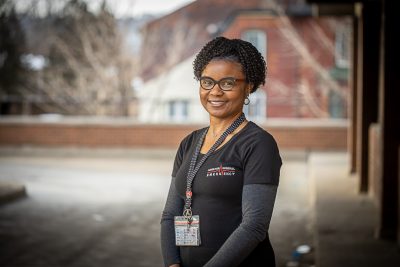 What does Black History Month mean to you?
What does Black History Month mean to you?
For me, Black History Month is about giving thanks and showing gratitude to those trailblazers who paved the way for me through struggle, sacrifice and persecution so that I can enjoy the rights and freedom I have today. It also gives me the opportunity to reflect on current contributions that Black people are making in society today.
Who are your role models, and why?
My role model is my late mother Florence. She was a woman of integrity who genuinely loved and cared for others. My mother was hardworking and persevered in the face of adversity. I witnessed her push through her pain to go to work and never complained. I believe the kind of work ethic I have today is because of the example that she set.
How are you celebrating Black History Month now that COVID has shut down events?
Now that there are no events highlighting Black History Month due to COVID, our family continues to do what we are accustomed to doing year-round. We acknowledge Black excellence in our home and we also speak about the struggles, triumphs and resiliency of Black people. We teach our daughters about diversity and why it’s important, so they can understand the value of people who think, act or sometimes look differently than them.
How has COVID affected your job/patients?
As a nurse working in a busy ER we have had our fair share of challenging days. Working through COVID has definitely made it more challenging. We have the same acuity in the patient population but now we have different protocols that we have to follow and the way we deliver care has also changed in a lot of ways. I work with an amazing multidisciplinary team whose main aim is to ensure our patients are safe and that they get the best possible care.
If you had one message for young Black people who are interested in a career in healthcare, what would it be?
It would be this: You will be embarking on a great journey of helping people and positively affecting their lives. Know that you are valuable. Do not let anyone define you by the colour of your skin. It is the content of your character that matters. The journey will not always be easy but it will be worth it.
Kosita Musabye
Autism Spectrum Disorder Consultant, Ron Joyce Children’s Health Centre
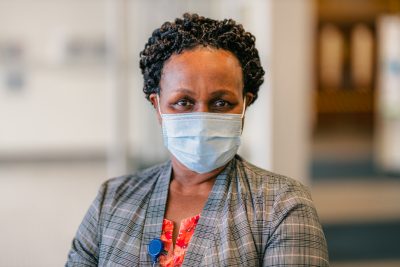 What does Black History Month mean to you?
What does Black History Month mean to you?
Black History Month is generally the time to recognize the contribution of black people to the world, our country and in our communities. Personally, it is once again a time to remember the courage of the ones who dared to challenge the status quo and stand up against discrimination.
Who are your role models-personal or public, and why?
- My personal role model was my mother. Being Black herself, she taught me to see myself as a valued human being.
- My public role model is Rosa Parks. She dared to keep her seat on the bus she was riding, even if it cost her a conviction.
How are you celebrating Black History Month now that COVID has shut down events?
I am celebrating virtually, attending events, conferences and reading the media. I miss the “real” gatherings that brought people together during this time of the year to celebrate Black History Month.
How has COVID affected your job/patients?
My job, like of many others, has been affected by COVID but I am able to work both virtually (whenever possible) and in physical attendance. Many children and families we serve need the physical presence for best outcomes. A number of children and their families are not able to receive services due to challenges brought by restrictions during the pandemic.
If you had one message for young Black people who are interested in a career in healthcare, what would it be?
A career in healthcare is challenging but rewarding. I would advise young Black people to prepare and go for it. I am sure that they can make a difference, not only in providing care, but also in inspiring others that it is possible. “There is a seat on the bus for them to grab.”
—————————–
This is a corrected story. An earlier version included an incorrect photo identified as Dr. Femi Ajani. We regret the error.

